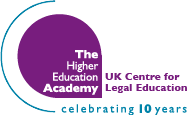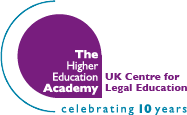Enhancing and promoting student skills: pro bono and CV development

contributors | abstract | presentation | biographies | paper
Contributors
Lydia Bleasdale-Hill and Paul Wragg (University of Leeds)
Format
Paper presentation
Abstract
This paper discusses the extent to which students engaged in extra-curricular activities are aware of the range of skills potentially developed through such activities, and ways in which to maximise this awareness. The paper intends to encourage delegates to consider how they can best ensure students appreciate/utilise those skills within an employment context, and provides an example of one way of doing so (through the development of an interactive website).
Engaging students in pro bono activities offers one opportunity for them to develop what might be regarded as key employability skills, while at the same time contributing to the local community in a positive manner. The paper discusses the results of a survey conducted with students engaging in such pro bono work at Leeds, reflecting upon the extent to which students accurately identified the skills they had gained from doing so. The results suggest that students invariably underestimate the skills they have gained, despite the provision of training (which, at least in part, helps the students to identify the value of the activity in adding to their skill set). These results suggest a more holistic approach needs to be taken, i.e. one which is not based purely on the notion that if students are told what they should be gaining from the activity, they will remember – and be able to communicate that to potential employers.
The second half of the paper develops this theme in the context of a recent faculty funded project to create a Law school orientated website designed to enhance student employability. The website achieves this aim by providing best practice information on CVs and covering letters across a broad range of careers suitable for a Law school graduate. In this way, the website demonstrates to the student the significance of particular skill sets for specific careers. Furthermore, the website showcases the various workshops and events organised by the Careers Service and the student run Leeds ‘LawSoc’ as well as the extensive range of pro bono opportunities within the School and so, since it only contains information relevant to a particular career type, removes the sense of ‘information overload’ that the student might otherwise experience.
Having established the background to the project, the steps taken to realise the project will be briefly outlined including empirical evidence of Law student perceptions toward personal development skills emerging from the law degree. This will then be contrasted with findings gathered after the website goes live in order to evaluate the impact of the website on raising student awareness of curricular and extra-curricular activities on employability skills.
This paper will contribute to the understanding of the skills students can gain from pro bono activities, and will provide delegates with an insight into one way of ensuring those skills are fully recognised and productively used by their own students. The development of the interactive website is discussed within the broader debate of employability skills and pro bono, rather than necessarily acting as a template for delegates to adopt.
Presentation
Short biographies of panel members
Lydia Bleasdale-Hill has been a lecturer in Criminal Law and Criminal Justice at the University of Leeds since 2005, prior to which she was a lecturer in Law at Manchester Metropolitan University. She oversees the School’s Widening Participation activities, including the implementation of the Sutton Trust/College of Law Pathways to Law programme, as well as the School’s Pro Bono activities. She is the Director of the University of Leeds Legal Advice Clinic, and the interim Director of the University of Leeds Innocence Project.
Paul Wragg is a lecturer in law at the University of Leeds. Prior to his appointment in 2009, he was a lecturer at Durham University and has also taught at the University of Birmingham. He is a qualified solicitor, having previously worked in practice in London, Leeds and Birmingham, and is the Careers Centre Representative in the School of Law. His principal research interest is in the field of freedom of expression with particular interests in freedom of commercial expression and media freedom in privacy law claims. He has written articles and book chapters in this field and has spoken at several national and international conferences on these topics. Amongst other things, he teaches Privacy, Free Speech and the Media as well as Contract Law at Leeds.
Last Modified: 3 February 2011



Comments
There are no comments at this time